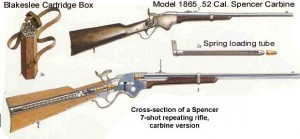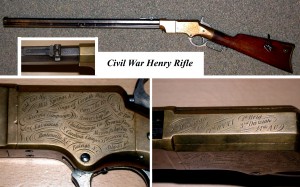Since gunpowder was discovered there have always been those who have tried to increase the firepower of weapons. With single shot weapons you had to increase the number of weapons, whether artillery or shoulder mounted musket/rifle, to increase the odds of causing casualties. (Lines of artillery or men shoulder to shoulder) You could add additional projectiles to the weapons at the expense of accuracy in an attempt to achieve the same thing. Canister and grape shot were used to great effect at close range in cannon and ‘buck and ball’ rounds were found to be of some use in muzzle loading long guns up through the Civil War period. Modern armies have experimented with multiple projectiles per round in small-arms to enhance hit potential. The goal has always been to send more “lead” downrange in the shortest period of time with some precision so as to be effective in either causing injury or disrupting the intentions of the enemy. To fulfill the need for firepower inventors have tried multiple barrels, multiple loads in one barrel, rotating barrels, the classic revolving cylinder and culminating in today’s magazine and belt fed weapons.
Today we see most militaries and security forces armed with the so-called “Assault Rifle” typified by the M4/M16 family and the many variations of the Kalashnikov AK series of rifles. These are magazine fed weapons usually capable of firing semi-automatic, automatic, or 3 round burst in the case of most of the US military issued rifles. These weapons typically fire a medium power round that is a compromise between power, recoil, and effective range. Civilian versions of these rifles are flying off the shelves of gunshops across the country and every good citizen should acquire one (or more) and support the rights of all law abiding persons to own the same. Now I have my ‘Black Rifle’ (an original Colt AR-15 sporter post ban w/ 16″ barrel sans flash hider and bayonet lug), but not everyone can afford these weapons and may find them politically incorrect for their neighborhood or jurisdiction. The ancestor of today’s military style rifle is still readily available and maybe even more practical for urban, suburban and rural environs.

- Spencer Rifle
One could say that the first truly practical assault rifles that saw relatively widespread use appeared during the Civil War. These were the Spencer and Henry repeating rifles. They were both lever actions and fired metallic cased rimfire rounds, but each operated a bit differently. The Spencer was loaded through the buttstock. To operate, the hammer was brought to half-cock, the lever brought down, forward and back which moved the .52 caliber cartridge from the magazine tube into the chamber, the hammer was brought to full cock and the trigger pulled. This could be done 7 times before reloading the magazine tube. The Spencer was famously tested by Abraham Lincoln who essentially forced a reluctant ordinance department to order significant numbers for Union troops, primarily cavalry units. The Henry was introduced in 1860 and bought in small numbers by the Union, but was usually an individual purchase. Some units that had wealthy members or patrons outfitted their men with Henry rifles. At the time there was no weapon that could equal the sustained rate of fire of the Henry. It held 15 rounds under the barrel. It’s lever action cocked the hammer and moved a cartridge from the magazine tube into the chamber in one smooth motion. Pull the trigger and repeat until ammunition is exhausted. The Henry utilized a .44 caliber rimfire round that propelled a 200-215 grain bullet around 1000/fps and was considered somewhat anemic even in its own day compared to the rifled muskets of most regular troops, but it was effective enough at the ranges armies were engaged in during the Civil War. The Henry was the rifle “you could load on Sunday and shoot all week”. Soldiers used to single shot muzzle loading muskets were quick to acquire these weapons whenever they could. Ammunition to feed these weapons were their major drawback and one reason why the ordnance department was hesitant to procure them in large numbers. There were already a myriad of weapons and calibers in the supply chain and new ones just added to the logistical problem.

- Henry Rifle
After the Civil War the Spencer sort of faded away. With surplus Spencers on the market, new rifles didn’t sell and the Army went to single shot breechloaders converted from surplus muskets and eventually to the 1873 “Trapdoor” Springfields. The Spencer’s action, compared to the Henry, was crude and crude rarely sells well in civilian markets. The Henry, on the other hand, fared much better. There seems to have been a steady demand for a reliable repeating rifle. Now the gun that really ‘won’ the West was the lowly shotgun and single shot hunting rifle as these were the most common weapons settlers possessed. Handguns were expensive luxuries and of limited use on a farm or ranch and a repeating rifle even more so. Still, there was a market and the well heeled lawman, cowboy or rancher would purchase quality firearms when they could. A shirt maker named Winchester was the largest investor in the Henry company and eventually took over. The Henry rifle was improved and became the classic Winchester lever action rifle. General Custer discovered the hard way that an enemy with superior numbers and significant numbers of Henry’s, Winchesters, and even some Spencers could over whelm and wipe out even the most well trained and experienced cavalry unit foolish enough to split its forces and attack without proper reconnaissance.
Collectors will talk about various models and rare chamberings, the 1866, 1873, 1876, 1895, the 1 of 1,000, engraved by Tiffany, the take-down and trapper models, etc. Books abound and may spark your own desire to acquire or collect. But the quintessential Winchester has to be the 1894. It became available in many calibers, but is most remembered as chambered for the new smokeless powder powered round the 30-30 Winchester. Some have said more deer have been taken by Winchesters in 30-30 than any other rifle/caliber combination in history. Especially handy in the wooded Eastern US, the Winchester is a familiar sight during hunting season. The lever action rifle is a familiar weapon to almost everyone through the westerns we all watched all through our lives at the movies or on TV. They are not as ‘menacing’ as those black rifles and as sad as that thought is to some of us, the reality is that in some areas a Winchester or Marlin will draw no attention in a gun rack or cabinet, while an AR-15, M1A1, SKS or Romanian AK will label you a “gun nut” or “Rambo”.
Before I could afford an AR-15 system, I picked up the next best thing in my opinion, a poor man’s military style weapon in the form of a new Winchester 1894 chambered in .357 magnum. It is a “Trapper” model with a 16″ round barrel. Having several revolvers in .357/.38 special allows me to feed a number of guns with the same ammunition. This can be important in a zombie apocalypse and maybe even in a real world disaster/survival scenario. Being a newer Winchester (2000ish) it has the hideous cross bolt safety at the top rear of the receiver and is a side ejector, unlike the original 19th century Winchesters, which is useful if optics are to be used. Compared to my Colt AR-15 it is roughly the same overall length and both are in the 6-7 pound range depending on sights and ammo load. The 1894 will hold a good 10 rounds of the .38 special +P’s I carry in my revolvers and am fully confident they will do the job if I do my part out to football field distances. For backwoods travel I would certainly look at some heavy cast loads in .357 magnum. The 1894 is svelte and handy. It carries well and could be fitted with a sling if you wanted. Don’t get me wrong, given a choice I’ll grab my AR and bugout bag, but if I only had the Winchester, I wouldn’t feel much at a disadvantage. Sure you can pull the trigger faster on an AR, but only hits count and the first shot from either is going to come within an eye-blink of each other. Follow up shots will be slightly slower with the 1894, but with practice you can expect to achieve a

- Winchester 1894 in .357 magnum
round per second AIMED fire. Watch a cowboy action match and you’ll see maybe 2-3 rounds per second hitting the targets with the lever guns from the top competitors. Keeping an AR fed is also easier. In a couple of seconds you can go from open bolt to fully charged with 20 or 30 round magazines. In a couple of seconds you can feed probably one round into the Winchester. So, you should treat the Winchester as a shotgun when it comes to ammunition management. That means shoot one, load one whenever possible and top off at every opportunity. Practice keeping that tube filled.
Now with USRAC Winchester gone (Belgian group Herstal now owns them) my Trapper has a little more value and I’m going to keep it. My Black Rifle may become an outlaw if certain political groups have their way. As I’ve explained, the century and a half old design can still fulfill its defensive/survival role if and when needed.
Zombies beware!


